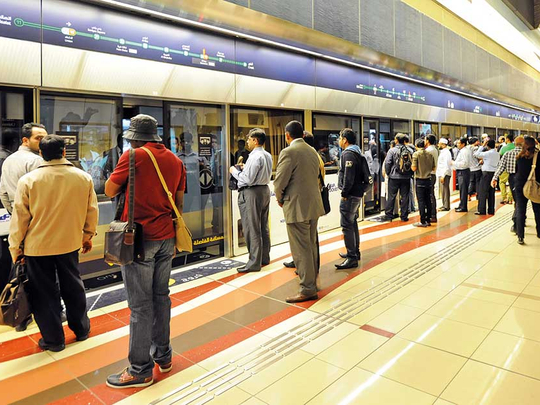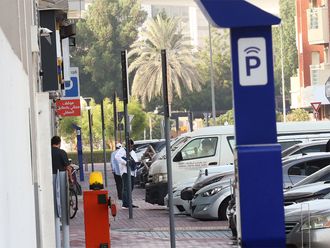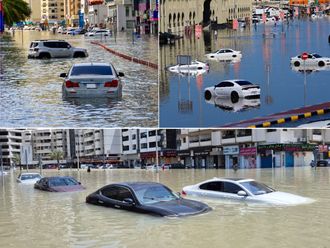
Dubai: Mohammad Aquib has been using Dubai Metro for his daily commutes to and from work since he arrived in the emirate six years ago. Aquib, like thousands of others, can’t imagine moving around the city without the popular rail network.
For the Pakistani office assistant, working in Business Bay and residing in Sharjah, Dubai Metro and the connecting bus network has become an integral part of his life.
“I got hooked on to Dubai Metro as soon as I came to Dubai. Initially, as a newcomer to the city, I didn’t have any option as neither could I drive and nor I was familiar with roads, but soon the convenience became the preference. I tried other options like driving and car-sharing but soon I figured out that public transport is the best and the most stress-free option,” said Aquib, who uses an intercity bus from Sharjah to Union metro station and then gets on the Red Line to Business Bay.
- Mohammad Aquib
Aquib says using the metro and buses saves him from the stress of driving through peak-hour traffic in Dubai and Sharjah.
Dubai marks Public Transport Day on Wednesday, celebrating the 12th anniversary of the Roads and Transport Authority, which has helped transform the city’s transport system over the past decade, through a Dh90-billion spent on upgrading the infrastructure and transport network in the emirate
“I can’t imagine going through the stress of peak-hour traffic after a long day’s work. It’s not an option for me. It takes me just 20 minutes from Business Bay to Union. Even if there is no space to sit, I am saved from the hassle of driving. On the connecting bus from Union to Sharjah, I sit and read or take a nap, which I can’t do if I am driving,” added Aquib, who is among thousands of peak-hour commuters.
- Jay Wilson
Unlike Aquib, Filipino project engineer Jay Wilson lives and works in Dubai and is among those who prefer using metro over driving.
“Since I came to Dubai, I have never considered driving as an option, as I have found metro very convenient for my daily commute to work as well as for going around the city. Even though the trains are more congested than before, I prefer metro as it connects with all important parts of the city and saves me the hassle of maintaining a car, finding parking and other related headaches,” said Wilson, who has been a Dubai resident for four years.
Wilson, whose job requires him to travel across the city, says he can’t imagine life in Dubai without metro.
With the number of people who have made it a part of their daily life — around 550,000 commute by metro daily — it is hard to imagine that Dubai Metro has been around just for eight years.
And it is not just the residents who swear by the world’s largest driverless rail network, tourists and visitors to Dubai also find it the best way to go around Dubai.
- Zainah Teega
Zainah Teega, who is on a visit to Dubai looking for a job, says if not for the public transport, she couldn’t have found her way around.
“I have been in Dubai for two months and everyday I step out for interviews hunting for jobs. As someone who is unfamiliar with the city, it is difficult to commute alone but thanks to the metro and buses, I have found it easy to go about the city, while it is also the most reasonable option,” said Teega from Uganda.
Like Teega, Mohammad Ali is also on a visit, but he is here only on a short vacation and has found metro the best to see the city.
“I think metro gives the best view of the city and connects with all the right places. For a tourist like me, it gives freedom to roam around and see different places on a budget,” said Ali, who is an Uzbek national.
Going by the sheer number of people dependent on Dubai Metro for their daily commute, to call the 75km-long rail network a lifeline of Dubai will not be an exaggeration.
According to Mattar Al Tayer, director-general and chairman of the Board of Executive Directors of the Roads and Transport Authority (RTA), says the introduction of Dubai Metro has over the years helped sustain Dubai’s economy, transporting 9 per cent of the population daily.
Operating in a city with a population of around 2.9 million, and with an additional million passing through the city daily, Dubai Metro has transported more than a billion people in eight years.
Dubai’s ever expanding public transport network helps 1.5 million people commute daily and the number is continuously going up, with the annual ridership jumping from 163 million in 2006 to 544 million last year.
And to imagine that the sprawling network, which also includes an 11km-long tram network, ferries, waterbuses and abra, has remained crime free in the past eight years apart from helping improve Dubai’s environment is mind-boggling.
According to Abdul Mohsin Younus, CEO of RTA’s Rail Agency, Dubai Metro along with other modes of transport in the city has recorded zero crime rate in the last eight years.
“The transport security personnel ensured a zero crime rate per million commuters through meticulous planning and by building a comprehensive database on security and safety statistics in the global transport sector,” said Younus.
He noted that across the world, crime rates are usually higher in crowded areas, particularly in urban transit networks, which makes Dubai Metro’s record more appreciable.
According to RTA stats, the mass transit system has helped reduce traffic considerably over the past decade, saving Dubai’s economy a whopping $34 billion in loss of time, fuel and cutting down carbon emissions.
New timings come into effect on Wednesday
Train services on the Red Line of Dubai Metro will begin 30 minutes earlier at 5am, from Wednesday.
The services on the Green Line will also start 20 minutes earlier at 5.30am, while the express metro service on the Red Line, which currently starts at 5.30am, will also start at 5am.
According to Mohammad Yousuf Al Mudharreb, director of Rail Operations at RTA’s Rail Agency, the step is intended to upgrade services, cater to the needs of riders and bring them happiness so that they reach their destinations faster.
Coinciding with the Public Transport Day, the service timings for the tram will also start 30 minutes earlier than the current schedule, operating from 6am instead of 6.30am.
Express metro services will be starting simultaneously from six stations, such as Rashidiya, Rigga, Emirates Towers, First Gulf Bank, Jumeirah Lakes Towers and the UAE Money Exchange.
The upgraded express service would start concurrently with the regular service from 5am.
“The selected stations are the busiest stations in terms of passenger using it to get to their workplaces in the early hours. This would ease congestion at the first metro service at all stations,” added Al Mudharreb.
Revised schedule
Red Line: Saturday to Wednesday — 5am to 12 midnight
Red Line: Thursday — 5am to 1am
Red Line: Friday — 10am to 1am
Green Line: Saturday to Wednesday — 5.30am to 12 midnight
Green Line: Thursday — 5.30am to 1am
Green Line: Friday — 10am to 1am
Dubai Tram: Saturday to Thursday — 6am to 1am
Dubai Tram: Friday — 9am to 1am
In numbers
Red Line
55 trains operate daily
24,229 morning peak-hour passengers
33,036 evening peak-hour passengers
Peak frequency is 2 minutes 38 seconds and off-peak varies by 4-6 minutes.
Green Line
17 trains operate daily
15,565 peak morning peak-hour passengers
12,682 evening peak-hour passengers
Peak frequency is 5 minutes and off-peak varies by 6-8 minutes.
5,626 trips throughout the week on both the lines.
49 metro stations
Buses
116 bus routes
1,510 buses
3,000 bus drivers
22 bus stations











